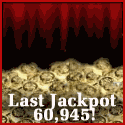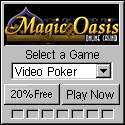Play
To Win
Tips and strategies to help make you a winning casino player Game
Rules
Learn: Blackjack, Baccarat, Craps, Roulette, Slots, Video Poker, Pai Gow Poker
Systems Gallery
Win more, more often with proven betting methods from the systems gallery
Order
Form
A secure on-line order form to purchase products advertised by Let's Talk
Winning.
Playing Online
All about gambling at online casinos. Find out where the best deals are
Links
and Things
Sign our guestbook, refer a friend, link to other gambling sites
Newsletter
Click above to read the current edition of our
weekly newsletter. Then get your own free subscription right here. Enter your e-mail
address for immediate delivery of an introductory issue, including a FREE ROULETTE SYSTEM:
Please tell all
your friends about it.
On-Line Forum
Post a gambling question or opinion - get an
answer . . .
 Wanna Win At Slots? Click
Here! Wanna Win At Slots? Click
Here!






It's now $50 bonus every month!







|
=========================================
Thursday, January 10, 2002
Baccarat - History and Rules
Hello everyone,
As the new
Baccarat system will be released next week, it would be a good idea to solidify the rules
of Baccarat and take a look at the game from a perspective of history, odds, and what one
needs to know in order to join the game.
No other casino game comes
close to the elegance of baccarat, which has always attracted the premier players from
Europe and the Orient.
By tradition, the baccarat pit is usually set aside from the main casino area, away from
all of the "common" games, and "common" players. Casinos spare no
expense when it comes to designing and decorating a baccarat pit. Tuxedoed dealers and
extravagant decor lure high-rollers (often referred to as "whales") and
discourage the average player.
If you want to see the world's rich and famous at play, a baccarat table at any major
casino is the most likely place to find them. In the U.S., more money is won and lost in a
single session of play at baccarat than at any other casino game.
In February of 1990, the late Akio Kashiwagi, who at one time was the world's
highest-roller, made history books when he won over $6 million at an Atlantic City
baccarat table. Playing in Atlantic City's Trump Plaza Casino, and betting $200,000 a
hand, Mr. Kashiwagi, also known as "The Warrior," put a significant dent in the
Plaza's bottom line for the month. But like all winners, he came back for more. The
following May, after six grueling days of play, Kashiwagi made the record books for the
second time. Losing close to $10 million, the Warrior recorded the largest loss at a
baccarat table in casino history.
The history behind baccarat is very interesting. In the 1500s, it was introduced to French
aristocrats looking for a new and exciting game of chance by their Italian counterparts.
They called it "chemin de fer," the French term for railroad. In the 19th
century, when the game became fashionable on the French Riviera, players nicknamed it
"chemmy" or "shimmy." Chemin de fer traveled from Europe to South
America and found a new home in Argentina. Casinos in Mar Del Plata became a gambling
paradise for wealthy South Americans. When the game reached Cuba, it underwent the rules
change that turned it into baccarat (in baccarat each player bets against the house; in
chemin de fer, players bet among themselves).
Baccarat as we know it today came to America via Cuba. In 1958, at Havana's Capri Hotel, a
young casino executive named Francis "Tommy" Renzoni, spent countless hours
watching gamblers play baccarat. When Fidel Castro's army defeated Cuban dictator
Fulgencio Batista, Castro closed all of the casinos in Havana. Three months later he
reopened them, but the North American gamblers didn't return, and in 1959 Renzoni left
Cuba and settled in Nevada.
Renzoni persuaded the owners of Sands Hotel to open up a baccarat pit. But the game was
not an overnight success in the United States. The roped-off pit and the game's
sophisticated aura intimidated American gamblers, who at the time were mostly Craps
players who had picked up a liking for the dice during military service in World War II.
Baccarat is a simple game to play. Two hands are dealt: One for the "player,"
and one for the "banker." The hand with the single-digit point count closer to
nine wins. Picture cards, 10s and any combination of cards totalling 10 have no value. All
other cards are counted at face value; An ace is one, a deuce is two, etc. Thus, a hand
containing an 8 and a 6 equals four (8 + 6 = 14 - 10 = 4). There are fixed rules governing
the drawing of additional cards.
A dealt total of 8 or 9 points is called a natural, and no additional cards will be drawn.
It is an automatic win unless the opposing hand has a higher natural (a 9 vs. an 8), or
the hand is a tie.
A natural of 8 points is called le petit, a total of nine, le grande. On all other
totals, 0 through 7, the drawing of an additional card depends strictly on established
rules of play. There is never more than one card drawn to a hand in any case.
The player need not be familiar with the rules for drawing on the third card for the
caller will direct the action and request that a third card be drawn if the rules require
it. Just follow the caller's instructions - as easy as that!
The Player's hand will be acted upon first, and then the Banker's. Despite the different
variations of baccarat, the third card rules for draw are consistent for games around the
world.
The two card total of the Player's hand determines whether a third card should be drawn
and is regulated by the following rules:
Player Rules
Two Card Total
Player's Action
0-5
Draw a card
6 or 7
Stand
8 or 9
Natural. Banker cannot draw.
After the Player's hand has
been acted upon, it is the Banker's turn. Whether the Banker position receives a
card depends upon two variables. In some cases, it depends upon his two card total,
and other times, it depends upon the card that the Player position has drawn.
If the Banker hand is 0, 1 or
2, a card is drawn, while with hands of 7, 8 and 9, no cards are drawn. The other
Banker totals of 3, 4, 5 and 6 are drawn upon depending upon what card the Player position
has drawn.
Rules for drawing or standing
can be broken up as follows.
Situation 1: Either the Player
or the Banker has a natural 8 or 9. It is an automatic win for the hand with the
natural. If both hands have naturals, the higher natural wins. A natural 9
beats a natural 8. If the naturals are equal, the hand is a tie.
Situation 2: If the
Player has a 0-5, Player must draw another card; if a 6-7, the Player must stand.
Situation 3: If Player stands,
then Banker hand follows the same rules as the Player - it must draw on totals of 0-5, and
stand on 6-7.
Situation 4: If Player draws,
Banker must draw or stand according to the value of the third card dealt as shown below in
the Banker Rules chart. Note that the Banker always draws on totals of 0-2, unless
of course, the Player has a natural.
Banker Rules
Banker
Bank Draws
Bank Does Not Draw
Total When Giving
When Giving
Player This Card
Player This Card
0-2
0-9
3
0-7,9
8
4
2-7
0-1,8-9
5
4,5-7
0-3,8-9
6
6-7
0-5,8-9
7
Banker Always Stands
8-9 A Natural -
Player Can't Draw
Good thing, it's only for the
dealer to remember those rules and not for the player. For system developers, it's a
challenge to come up with some kind of a card counting method, and I haven't seen a
successful one. With the above rules, that are much more complex than in Blackjack,
it makes it very complicated to build such a method. Flat Bet Mini Play deals with
the resulting outcome and takes advantage of unavoidable streaks, chops and other patterns
that are formed.
Baccarat calls for just a few
decisions: How much to bet and whether to bet on the bank, on the player or on a tie.
Seasoned players avoid betting on ties, and for good reason. The casino will pay nine for
one odds (which is really eight to one) if you bet that a hand will tie and it does. The
casino advantage on this bet is over 14%. The casino has a 1.06% edge on the banker's
hand, and a 1.24% edge on the player's hand. This percentage might lead you to assume that
you're better off betting with the banker. But keep in mind that the casino charges a
commission of 5% on your winnings when betting with the banker.
Some players write down the results of every hand on a scorecard (called "table de
banque" in French), hoping to find a pattern that will help them predict the outcome
of the following hand. Flat Bet Mini Play will do that for you automatically.
The game is easy and fun to play. It's not like blackjack, where one person's
"dumb" play can affect the outcome of that hand for everyone at the table. In
baccarat there is no such thing as a dumb play. The way you play has no effect on the
other players.
In the meantime, DC-7, the Incredible Craps System is doing really great.
Positive feedback keeps coming in. I recently found the following post in the
discussion forum:
"I seldom post on these
boards because I am not interested in a 2-way dialog; I use this to obtain and develop
ideas. I make this exception because I actually have something positive to say about a
system, which is a first in my experience.
I have played 12 hours "live" at the Grand in Tunica, testing with $1 units.
Flat-betting only, I averaged 5.2 units /hr. Never down more than 2 units. I have thus far
tested it through the first 32 pages of the Zumma system-tester book and have seen
averages (both flat betting and with progression) in line with what the author claimed in
the other tester book. The most I was down at any given time was 6 units; just playing it
out, it came right back and went positive. Please note that my testing thus far is
obviously only a very small sample of results. For myself, I will feel that I have
something conclusive when I have gone all the way through the system tester book and have
at least 50 hours of live results. When I have these, I will post all the relevant
detailed statistics. I doubt I will have all of this for at least 10 weeks.
The other person I went in with to purchase the system is retired and lives much closer to
a casino than I do - he has spent a lot more live time testing than I have (he has not
done anything with a tester book). He says he has had spectacular results and is now
comfortable using $50 units, although he provided no exact details or
numbers." Mike S.
Read more about DC-7 and
Frequently Asked Questions at http://www.letstalkwinning.com/dc-7.htm.
Today is the last day to take advantage of
the year-end specials. If you purchase items that total $300, you can have an
additional system of your choice for free, excluding DC-7. Since the newsletter is
coming late in the evening, I will extend this offer to include the weekend, until
midnight Eastern Time, Sunday January 13, 2002.
Wishing you all the
best,
Until next week,
Izak
| WOULD YOU LIKE
TO SUBSCRIBE? |
 |
If you missed any
newsletter, click here for an archive.

|
 Let's Talk Winning
Let's Talk Winning